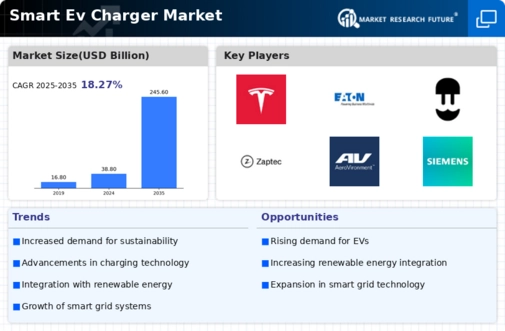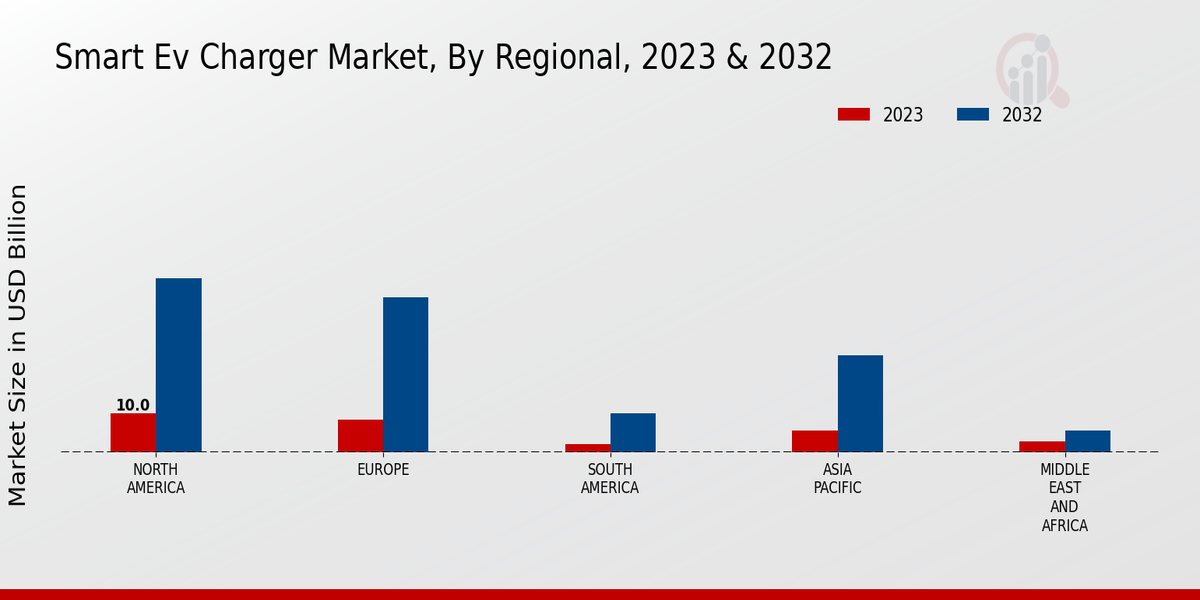Market Growth Projections
The Global Smart EV Charger Market Industry is poised for substantial growth, with projections indicating a market value of 38.8 USD Billion in 2024 and an anticipated increase to 245.6 USD Billion by 2035. This remarkable growth trajectory suggests a compound annual growth rate (CAGR) of 18.27% from 2025 to 2035. Such figures underscore the increasing importance of smart charging solutions in the broader context of electric vehicle adoption and sustainability efforts. The market's expansion is likely driven by various factors, including technological advancements, government policies, and the rising demand for electric vehicles, all contributing to a dynamic and evolving industry.
Rising Demand for Electric Vehicles
The increasing adoption of electric vehicles (EVs) is a primary driver for the Global Smart EV Charger Market Industry. As consumers become more environmentally conscious, the demand for EVs is projected to surge, leading to a significant need for charging infrastructure. In 2024, the market is valued at 38.8 USD Billion, reflecting the growing trend towards sustainable transportation. This shift is likely to accelerate as governments worldwide implement policies to promote EV usage, aiming for substantial reductions in carbon emissions. Consequently, the expansion of the EV market directly correlates with the growth of smart charging solutions, indicating a robust future for the industry.
Expansion of Charging Infrastructure
The expansion of charging infrastructure is a critical factor influencing the Global Smart EV Charger Market Industry. As the number of electric vehicles on the road increases, the need for accessible and efficient charging stations becomes paramount. Governments and private entities are investing heavily in the development of charging networks to meet this demand. This expansion is not limited to urban areas; rural regions are also seeing the installation of charging stations to ensure comprehensive coverage. The growth of charging infrastructure is expected to support the market's trajectory, with projections indicating a market value of 245.6 USD Billion by 2035, highlighting the importance of infrastructure in the overall EV ecosystem.
Government Incentives and Regulations
Government initiatives play a crucial role in shaping the Global Smart EV Charger Market Industry. Various countries are introducing incentives such as tax credits, rebates, and grants to encourage the installation of EV charging stations. Regulations mandating the inclusion of charging infrastructure in new developments further bolster market growth. For instance, certain regions have set ambitious targets for EV adoption, which necessitates a corresponding increase in charging capabilities. These supportive measures not only stimulate demand but also create a favorable environment for investment in smart charging technologies, thereby enhancing the overall market landscape.
Integration of Renewable Energy Sources
The integration of renewable energy sources into the charging infrastructure is emerging as a vital driver for the Global Smart EV Charger Market Industry. As the world shifts towards sustainable energy solutions, the incorporation of solar and wind energy into EV charging stations is becoming increasingly prevalent. This not only reduces the carbon footprint of charging but also enhances energy efficiency. The synergy between renewable energy and smart charging technologies is likely to attract environmentally conscious consumers and businesses alike. As a result, this trend could significantly influence market dynamics, fostering growth and innovation within the industry.
Technological Advancements in Charging Solutions
Technological innovation is a significant driver of the Global Smart EV Charger Market Industry. Advancements in charging technology, such as ultra-fast charging and wireless charging solutions, are enhancing the user experience and reducing charging times. These innovations are likely to attract more consumers to electric vehicles, thereby increasing the demand for smart chargers. As the industry evolves, manufacturers are focusing on integrating smart features such as app connectivity, real-time monitoring, and energy management systems. This technological evolution is expected to contribute to the market's projected growth, with a compound annual growth rate (CAGR) of 18.27% anticipated from 2025 to 2035.















